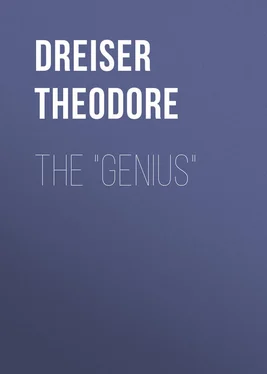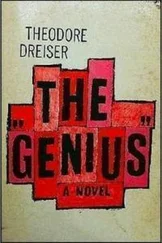Theodore Dreiser - The Genius
Здесь есть возможность читать онлайн «Theodore Dreiser - The Genius» — ознакомительный отрывок электронной книги совершенно бесплатно, а после прочтения отрывка купить полную версию. В некоторых случаях можно слушать аудио, скачать через торрент в формате fb2 и присутствует краткое содержание. Жанр: foreign_antique, foreign_prose, на английском языке. Описание произведения, (предисловие) а так же отзывы посетителей доступны на портале библиотеки ЛибКат.
- Название:The Genius
- Автор:
- Жанр:
- Год:неизвестен
- ISBN:нет данных
- Рейтинг книги:5 / 5. Голосов: 1
-
Избранное:Добавить в избранное
- Отзывы:
-
Ваша оценка:
- 100
- 1
- 2
- 3
- 4
- 5
The Genius: краткое содержание, описание и аннотация
Предлагаем к чтению аннотацию, описание, краткое содержание или предисловие (зависит от того, что написал сам автор книги «The Genius»). Если вы не нашли необходимую информацию о книге — напишите в комментариях, мы постараемся отыскать её.
The Genius — читать онлайн ознакомительный отрывок
Ниже представлен текст книги, разбитый по страницам. Система сохранения места последней прочитанной страницы, позволяет с удобством читать онлайн бесплатно книгу «The Genius», без необходимости каждый раз заново искать на чём Вы остановились. Поставьте закладку, и сможете в любой момент перейти на страницу, на которой закончили чтение.
Интервал:
Закладка:
"Why may not life be always like this?" he would ask, and then he would answer himself out of his philosophy that it would become deadly after awhile, as does all unchanging beauty. The call of the soul is for motion, not peace. Peace after activity for a little while, then activity again. So must it be. He understood that.
Just before he left for New York, Christina said to him:
"Now, when you see me again I will be Miss Channing of New York. You will be Mr. Witla. We will almost forget that we were ever here together. We will scarcely believe that we have seen what we have seen and done what we have done."
"But, Christina, you talk as though everything were over. It isn't, is it?"
"We can't do anything like this in New York," she sighed. "I haven't time and you must work."
There was a shade of finality in her tone.
"Oh, Christina, don't talk so. I can't think that way. Please don't."
"I won't," she said. "We'll see. Wait till I get back."
He kissed her a dozen farewells and at the door held her close once more.
"Will you forsake me?" he asked.
"No, you will forsake me. But remember, dear! Don't you see? You've had all. Let me be your wood nymph. The rest is commonplace."
He went back to his hotel with an ache in his heart, for he knew they had gone through all they ever would. She had had her summer with him. She had given him of herself fully. She wanted to be free to work now. He could not understand it, but he knew it to be so.
CHAPTER XXV
It is a rather dreary thing to come back into the hot city in the summer after a period of beauty in the mountains. The quiet of the hills was in Eugene's mind, the glisten and babble of mountain streams, the soar and poise of hawks and buzzards and eagles sailing the crystal blue. He felt lonely and sick for awhile, out of touch with work and with practical life generally. There were little souvenirs of his recent happiness in the shape of letters and notes from Christina, but he was full of the premonition of the end which had troubled him on leaving.
He must write to Angela. He had not thought of her all the time he had been gone. He had been in the habit of writing to her every third or fourth day at least; while of late his letters had been less passionate they had remained fairly regular. But now this sudden break coming – it was fully three weeks – made her think he must be ill, although she had begun to feel also that he might be changing. His letters had grown steadily less reminiscent of the joys they had experienced together and of the happiness they were anticipating, and more inclined to deal with the color and character of city life and of what he hoped to achieve. Angela was inclined to excuse much of this on the grounds of the special effort he was making to achieve distinction and a living income for themselves. But it was hard to explain three weeks of silence without something quite serious having happened.
Eugene understood this. He tried to explain it on the grounds of illness, stating that he was now up and feeling much better. But when his explanation came, it had the hollow ring of insincerity. Angela wondered what the truth could be. Was he yielding to the temptation of that looser life that all artists were supposed to lead? She wondered and worried, for time was slipping away and he was setting no definite date for their much discussed nuptials.
The trouble with Angela's position was that the delay involved practically everything which was important in her life. She was five years older than Eugene. She had long since lost that atmosphere of youth and buoyancy which is so characteristic of a girl between eighteen and twenty-two. Those few short years following, when the body of maidenhood blooms like a rose and there is about it the freshness and color of all rich, new, lush life, were behind her. Ahead was that persistent decline towards something harder, shrewder and less beautiful. In the case of some persons the decline is slow and the fragrance of youth lingers for years, the artifices of the dressmaker, the chemist, and the jeweller being but little needed. In others it is fast and no contrivance will stay the ravages of a restless, eager, dissatisfied soul. Sometimes art combines with slowness of decay to make a woman of almost perennial charm, loveliness of mind matching loveliness of body, and taste and tact supplementing both. Angela was fortunate in being slow to fade and she had a loveliness of imagination and emotion to sustain her; but she had also a restless, anxious disposition of mind which, if it had not been stayed by the kindly color of her home life and by the fortunate or unfortunate intervention of Eugene at a time when she considered her ideal of love to have fairly passed out of the range of possibility, would already have set on her face the signs of old maidenhood. She was not of the newer order of femininity, eager to get out in the world and follow some individual line of self-development and interest. Rather was she a home woman wanting some one man to look after and love. The wonder and beauty of her dream of happiness with Eugene now made the danger of its loss and the possible compulsory continuance of a humdrum, underpaid, backwoods existence, heart-sickening.
Meanwhile, as the summer passed, Eugene was casually enlarging his acquaintance with women. MacHugh and Smite had gone back home for the summer, and it was a relief from his loneliness to encounter one day in an editorial office, Norma Whitmore, a dark, keen, temperamental and moody but brilliant writer and editor who, like others before her, took a fancy to Eugene. She was introduced to him by Jans Jansen, Art Director of the paper, and after some light banter she offered to show him her office.
She led the way to a little room no larger than six by eight where she had her desk. Eugene noticed that she was lean and sallow, about his own age or older, and brilliant and vivacious. Her hands took his attention for they were thin, shapely and artistic. Her eyes burned with a peculiar lustre and her loose-fitting clothes were draped artistically about her. A conversation sprang up as to his work, which she knew and admired, and he was invited to her apartment. He looked at Norma with an unconsciously speculative eye.
Christina was out of the city, but the memory of her made it impossible for him to write to Angela in his old vein of devotion. Nevertheless he still thought of her as charming. He thought that he ought to write more regularly. He thought that he ought pretty soon to go back and marry her. He was approaching the point where he could support her in a studio if they lived economically. But he did not want to exactly.
He had known her now for three years. It was fully a year and a half since he had seen her last. In the last year his letters had been less and less about themselves and more and more about everything else. He was finding the conventional love letters difficult. But he did not permit himself to realize just what that meant – to take careful stock of his emotions. That would have compelled him to the painful course of deciding that he could not marry her, and asking her to be released from his promise. He did not want to do that. Instead he parleyed, held by pity for her passing youth and her undeniable affection for him, by his sense of the unfairness of having taken up so much of her time to the exclusion of every other person who might have proposed to her, by sorrow for the cruelty of her position in being left to explain to her family that she had been jilted. He hated to hurt any person's feelings. He did not want to be conscious of the grief of any person who had come to suffering through him and he could not make them suffer very well and not be conscious. He was too tender hearted. He had pledged himself to Angela, giving her a ring, begging her to wait, writing her fulsome letters of protest and desire. Now, after three years, to shame her before her charming family – old Jotham, her mother, her sisters and brothers – it seemed a cruel thing to do, and he did not care to contemplate it.
Читать дальшеИнтервал:
Закладка:
Похожие книги на «The Genius»
Представляем Вашему вниманию похожие книги на «The Genius» списком для выбора. Мы отобрали схожую по названию и смыслу литературу в надежде предоставить читателям больше вариантов отыскать новые, интересные, ещё непрочитанные произведения.
Обсуждение, отзывы о книге «The Genius» и просто собственные мнения читателей. Оставьте ваши комментарии, напишите, что Вы думаете о произведении, его смысле или главных героях. Укажите что конкретно понравилось, а что нет, и почему Вы так считаете.








